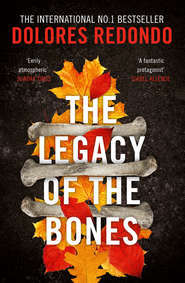По всем вопросам обращайтесь на: info@litportal.ru
(©) 2003-2025.
✖
Offering to the Storm
Автор
Год написания книги
2019
Настройки чтения
Размер шрифта
Высота строк
Поля
Amaia looked at her.
‘You’ve been running from Rosario all your life, you’ve become accustomed to living with that threat, with the knowledge that she is out there, that she is still out to harm you. But it’s over now, Amaia. It’s over. Ama is finally dead, and – God forgive me for saying so – but I’m not sorry. I know how much she made you suffer, what she almost did to Ibai, but I saw her coat with my own eyes: it was sodden with water. No one could have climbed out of that river alive in the middle of the night. Trust me, Amaia: she’s dead.’
Amaia parked her car opposite Aunt Engrasi’s house and sat for a while, enjoying the golden glow illuminating the windows from inside, as though at its heart a tiny sun or fire were perpetually burning. She gazed up at the overcast sky; night was falling, and although the lights had been on all day, it was only now that they shone in all their glory. She recalled how, as a child, she’d look forward to the occasions when her aunt would ask her to take the rubbish out because it meant she could steal away to the low wall down by the river. She’d sit there, entranced by the sight of the house all lit up, until her aunt began calling for her. Only then would she go inside, her hands and face burning with cold. The sensation of returning home was so intensely pleasurable that she turned it into a custom, a way of drawing out the joy of re-entering the house. She thought of it as a kind of Taoist ritual, one that she’d carried into adulthood, only abandoning the habit when she became a mother. She so longed to see Ibai that no sooner did she reach the door than she would rush inside, eager to touch her son, to kiss him. Tonight, rediscovering this secret, magical game, she reflected on the way she clung, to the point of obsession, to those rituals that had kept her sane through her traumatic childhood. Perhaps it was time for her to leave the past behind.
She climbed out of the car and made her way into the house.Without stopping to take off her coat, she entered the sitting room, where her aunt was clearing up after her game of cards with the Golden Girls. James was holding a book, distractedly, watching Ibai who was in his baby hammock on the sofa. Amaia sat down next to her husband and took his hand in hers.
‘I’m so sorry, things got complicated. I couldn’t get away.’
‘That’s okay,’ he said, without conviction, and leaned over to kiss her.
She slipped out of her coat and draped it over the back of the sofa, then gathered Ibai into her arms.
‘Ama’s been gone all day, and she missed you, did you miss me?’ she whispered, cradling the boy in her arms. He grabbed a strand of her hair, tugging it painfully. ‘I suppose you heard about what happened at the funeral parlour this morning,’ she said, looking up at her aunt.
‘Yes, the girls told us. It’s a terrible tragedy. I’ve known the family for years, they’re good people. Losing a young baby like that …’ Engrasi broke off to go to Ibai and tenderly stroke his head. ‘I can’t bear to think about it.’
‘No wonder the father went mad with grief. I can’t imagine what I’d do,’ said James.
‘The investigation is ongoing, so I can’t comment – but that isn’t the only reason why I’m late. Clearly, she hasn’t been here, otherwise you’d have told me already.’
James and Engrasi looked at her, puzzled.
‘Flora is here in Elizondo. Ros was in a real state when she called me – apparently, the first thing Flora did was stop off at the bakery, just to wind her up. Then, when I arrived, she announced that she’d come to arrange a funeral service for Rosario.’
Engrasi stopped ferrying glasses back and forth, and looked at Amaia, concerned.
‘Well, I’ve never had much time for Flora, as you know, but I think it’s a great idea,’ said James.
‘How can you say that, James! We don’t even know for sure that she’s dead. To hold a funeral would be utterly absurd!’ exclaimed Engrasi.
‘I disagree. It’s been over a month since the river took Rosario—’
‘We don’t know that,’ Amaia broke in. ‘The fact that her coat was in the water doesn’t mean a thing. She could have thrown it in there to put us off the scent.’
‘To do what? Listen to yourself, Amaia. You’re talking about an old lady, wading across a flooded river in the dark during a storm. You’ve got to admit, that’s highly unlikely.’
Engrasi was standing between the poker table and the kitchen door, lips compressed, listening to them argue.
‘Highly unlikely? You didn’t see her, James. She walked out of that clinic, came to this house, stood where I am now and took our baby boy. She trudged for miles through the woods to get to the cave where she intended to offer him up as a sacrifice. That was no feeble old woman – she was determined and able. I know, I was there.’
‘It’s true, I wasn’t there,’ he replied tersely. ‘But if she’s still alive, where has she been all this time? Why hasn’t she turned up? Scores of people spent hours searching for her, they fished her coat out of the river – she must have drowned, Amaia. The Guardia Civil thinks so, the local police force thinks so, I spoke to Iriarte and he thinks so. Even your friend the magistrate agrees,’ he added pointedly. ‘The river swept her away.’
Ignoring his insinuations, Amaia shook her head and carried on rocking Ibai, who, disturbed by their raised voices, had started to cry.
‘I don’t care. I don’t believe it,’ she muttered.
‘That’s the problem, Amaia,’ snapped James. ‘This is all about you and what you believe. Have you ever stopped to think what your sisters might be feeling? Has it occurred to you that they could be suffering too, that they might need to walk away from this episode once and for all, and that what you believe or don’t believe isn’t the only thing that counts?’
Ros, who had just come in, was standing in the doorway looking alarmed.
‘Everyone knows you’ve suffered a lot, Amaia,’ James went on, ‘but this isn’t just about you. Stop for a moment and think about what other people need. I see nothing wrong with what your sister Flora is trying to do. In fact it might prove beneficial to everyone’s mental health, including mine, which is why I’ll be going to the funeral, and I hope you’ll come with me, this time.’
There was a note of reproach in his voice, and Amaia felt hurt, but above all shocked that James should bring up a subject she thought they’d resolved; it wasn’t like him. By now, Ibai was screaming at the top of his lungs, wriggling in her arms, upset by the tension in her body, her quickened breathing. She held him close, trying to calm him. Without saying a word, she went upstairs, ignoring Ros, who stood motionless in the doorway.
‘Amaia …’ Ros whispered to her sister as she brushed past.
James watched her leave the room then looked uneasily from Ros to Engrasi.
‘James—’ Engrasi started to say.
‘Please don’t, Auntie. Please, I beg you, don’t feed Amaia’s fears, or encourage her doubts. If anyone can help her turn the page, it’s you. I’ve never asked anything of you before, but I’m asking you now – because I’m losing her, I’m losing my wife,’ he said dejectedly, slumping back in his seat.
Amaia kept rocking Ibai until he stopped crying, then she lay down on the bed, placing him beside her so that she could enjoy her son’s bright eyes, his clumsy little hands touching her eyes, nose and mouth until gradually he fell asleep. Just as his mother’s tension had overwhelmed him earlier, she felt infected now by his placid calm.
Amaia realised how important the show at the Guggenheim had been for James; she understood why he was disappointed that she hadn’t gone with him. But they’d talked about this. If she had, Ibai would probably be dead. She knew that James understood, but understanding wasn’t the same as accepting. She heaved a sigh, and Ibai sighed too, as though echoing her. Touched, she leaned over to kiss him.
‘My darling boy,’ she whispered, marvelling at his perfect little features, enveloped by a mysterious calm she only experienced when she was with him, bewitching her with his scent of butter and biscuits, relaxing her muscles, drawing her gently into a deep sleep.
She realised she was dreaming, and that her fantasies were inspired by Ibai’s scent. She was at the bakery, long before it became the setting for her nightmares; her father, dressed in his white jacket, was flattening out puff pastry with a steel rolling pin, before it became a weapon. The squares of white dough gave off a creamy, buttery smell. Music drifted through the bakery from a small transistor radio her father kept on the top shelf. She didn’t recognise the song, yet, in her dream, the little girl who was her was mouthing some of the lyrics. She liked to be alone with her father, she liked to watch him work, while she danced about the marble counter, breathing in the odour she now realised was Ibai’s, but which back then came from the butter biscuits. She felt happy – in that way unique to little girls who are the apple of their father’s eye. She had almost forgotten how much he loved her, and remembering, even in a dream, made her feel happy once more. Round and round she spun, performing elegant pirouettes, her feet floating above the ground. But when she turned to smile at him, he had vanished. The kneading table was empty, no light penetrated the high windows. She must hurry, she must go home at once, or else her mother would become suspicious. ‘What are you doing here?’ All at once, the world became very small and dark, curving at the edges, until her dream landscape turned into a tunnel down which she was forced to walk; the short distance between her and the bakery door was transformed into a long, winding passageway at the end of which shone a small, bright light. Afterwards, there was nothing, the benign darkness blinded her, the blood drained from her head. ‘Bleeding doesn’t hurt, bleeding is peaceful and sweet, like turning into oil and trickling away,’ Dupree had told her. ‘And the more you bleed the less you care.’ It’s true, I don’t care, the little girl thought. Amaia felt sad, because little girls shouldn’t accept death, but she also understood, and so, although it pained her, she left her alone. First she heard the panting, the quick gasps of eager anticipation. Then, without opening her eyes, she could sense her mother approaching, slowly, inexorably, hungry for her blood, her breath. Her little girl’s chest that scarcely contained enough oxygen to sustain the thread of consciousness that bound her to life. The presence, like a weight on her abdomen, crushed her lungs, which emptied like a pair of wheezing bellows, letting the air escape through her mouth, as the cruel, ravenous lips, covered her mouth, sucking out her last breath.
James entered the room, closing the door behind him. He sat down beside her on the bed, contemplating her for a moment, experiencing the pleasure of seeing someone who is truly exhausted sleep. He reached for the blanket lying at the foot of the bed, and drew it up to her waist. As he leaned over to kiss her, she opened startled unseeing eyes; when she saw it was him, she instantly relaxed, resting her head back on the pillow.
‘It’s okay, I was dreaming,’ she whispered, repeating the words, which, like an incantation, she had recited practically every night since she was a child. James sat down again. He watched Amaia in silence, until she gave a faint smile, then embraced her.
‘Do you think they might still serve us at that restaurant?’
‘I cancelled; you’re too tired. We’ll go there another time …’
‘How about tomorrow? I have to drive to Pamplona, but I promise I’ll spend the afternoon with you and Ibai. In which case, you have to invite me out to dinner in the evening,’ she added, chuckling.
‘Come downstairs and have something to eat,’ he said.
‘I’m not hungry.’
But James stood up and held out his hand, smiling, and she followed him.
7 (#ulink_15dd5449-7766-5c96-8a5a-51e9f59650a1)
Dr Berasategui had lost none of the composure or authority one might expect from a renowned psychiatrist, and his appearance was as neat and meticulous as ever; when he clasped his hands on the table, Amaia noticed that his nails were manicured. His face remained unsmiling as he greeted her with a polite ‘good morning’ and waited for her to speak.
‘Dr Berasategui, I confess I’m surprised that you agreed to see me. I imagine prison life must be tedious for a man like you.’
‘I don’t know what you mean.’ His reply seemed sincere.
‘You needn’t pretend with me, Doctor. During the past month I’ve been reading your correspondence, I’ve visited your apartment on several occasions, and, as you know, I’ve had the opportunity to familiarise myself with your culinary taste …’ His lips curled slightly at her last words. ‘For that reason alone, I imagine you find life in here intolerably vulgar and dull. Not to mention what it must mean to be deprived of your favourite pastime.’
‘Don’t underestimate me, Inspector. Adaptability is one of my many talents. Actually, this prison isn’t so different from a reformatory school in Switzerland. That’s an experience which prepares you for anything.’











